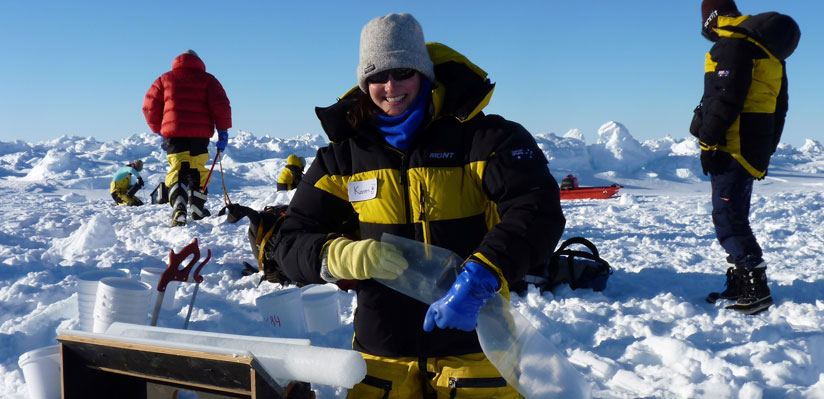
I am a scientist – a marine biologist at the Australian Antarctic Division who works within the Southern Ocean Ecosystems program. My specific focus is on phytoplankton – microscopic single celled plants in the ocean that form the bottom of the food chain.
Phytoplankton feeds the krill in the Antarctic ecosystem. They are also responsible for consuming carbon dioxide when they photosynthesize and the vast number of them in the ocean means that they are providing a good buffer against global warming – it would be way worse if the phytoplankton were not there.
I go to Antarctica every two to three years – dependent on which project proposals are approved. I have a permanent position at the Australian Antarctic Division – a pretty rare thing for a scientist now so I am lucky.
When I am not in Antarctica, I am analysing samples, writing up the data, collaborating on new research proposals, and getting ready to go on the next trip which always takes a lot of preparation and time. If you leave even one thing behind your work might fail!
Why am I a scientist? Well it was partially thanks to Dominic College. They found me some work experience at the Biochemistry Department in the medical school at the University of Tasmania, which I loved – helping with the research. I decided I wanted to do science at University.
I decided to work for a year and landed a full time job at the University of Tasmania thanks to the experience I gained when Dominic sent me to the Biochemistry Department.
I worked on the floor above – in the Physiology Department in the medical school and loved every moment of it – helping with the various research projects in the department and setting up practical classes for the medical students.
It was hard to leave the job as I loved it so much, but they kept me on a casual basis during my University years, so I was able to earn a bit of money to pay my way through Uni.
I decided to study biology at University, majoring in Botany and Zoology. It was in my third year that I fell in love with phytoplankton – I never knew they existed until I looked down the microscope and they are incredibly intricate.
After my bachelor degree I did Honours (also at the University of Tasmania) with a project looking at the effect of nutrient inputs, such as from stormwater drains and runoff, on phytoplankton in the Derwent River. This involved a lot of boating and the field work aspect of biology is also a thing I love.
I gained First Class Honours and from there went to the University of Adelaide to do a PhD – looking at the ecology of blue-green algae (a specific group of phytoplankton) in the Murray River.
I got my foot in the door at the Australian Antarctic Division (AAD) thanks to a friend who did Honours in the same laboratory as me at the University of Tasmania. He was working on phytoplankton at the AAD and needed a volunteer assistant to go with him to Antarctica. I immediately said yes and was on the ship a few months later – I couldn’t believe my luck!
A few years later they employed me on a short term contract to do another voyage. Then, when I finished my PhD, the AAD employed me full-time. I have undertaken a total of seven marine science voyages on the Aurora Australis during my employment at the AAD, and have also spent six months at Davis Station doing research there.
Science has also taken me to other parts of the world – I spent three months in Namibia in Africa doing some vegetation mapping in the desert at Gobabeb Research Station, and supervising a Masters student there. I also spent three months in the cloud forests of Honduras running a scientific expedition camp called Operation Wallacea – for a non-government organisation concerned with biodiversity and conservation issues.
Biologists love life!
“Always believe in your dreams. The happiest people are those who back themselves and have the confidence to turn their dreams into a fulfilling reality. If you are like me you may be scared of stuffing up along the way – but don’t be! Mistakes allow you to gain valuable insight and they will greatly help you in the long-run.”
This is an abridged version of an article written by Dr Karen Westwood. The article originally appeared in Dominic College’s Veritas Magazine, and is reproduced with permission.